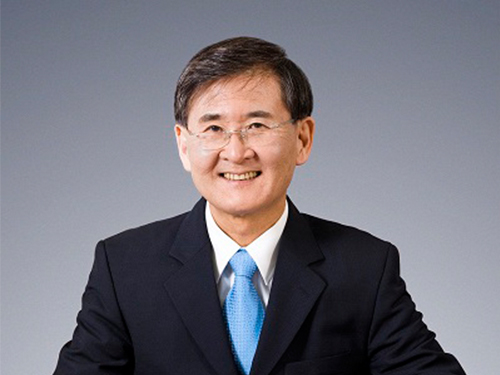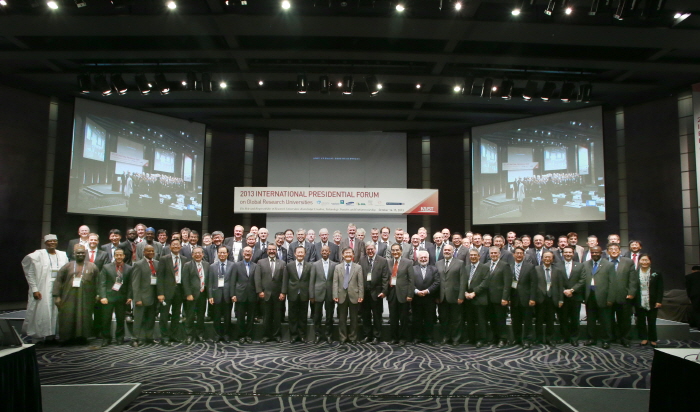economic+growth
-
 ‘Urban Green Space Affects Citizens’ Happiness’
Study finds the relationship between green space, the economy, and happiness
A recent study revealed that as a city becomes more economically developed, its citizens’ happiness becomes more directly related to the area of urban green space.
A joint research project by Professor Meeyoung Cha of the School of Computing and her collaborators studied the relationship between green space and citizen happiness by analyzing big data from satellite images of 60 different countries.
Urban green space, including parks, gardens, and riversides not only provides aesthetic pleasure, but also positively affects our health by promoting physical activity and social interactions. Most of the previous research attempting to verify the correlation between urban green space and citizen happiness was based on few developed countries. Therefore, it was difficult to identify whether the positive effects of green space are global, or merely phenomena that depended on the economic state of the country. There have also been limitations in data collection, as it is difficult to visit each location or carry out investigations on a large scale based on aerial photographs.
The research team used data collected by Sentinel-2, a high-resolution satellite operated by the European Space Agency (ESA) to investigate 90 green spaces from 60 different countries around the world. The subjects of analysis were cities with the highest population densities (cities that contain at least 10% of the national population), and the images were obtained during the summer of each region for clarity. Images from the northern hemisphere were obtained between June and September of 2018, and those from the southern hemisphere were obtained between December of 2017 and February of 2018.
The areas of urban green space were then quantified and crossed with data from the World Happiness Report and GDP by country reported by the United Nations in 2018. Using these data, the relationships between green space, the economy, and citizen happiness were analyzed.
The results showed that in all cities, citizen happiness was positively correlated with the area of urban green space regardless of the country’s economic state. However, out of the 60 countries studied, the happiness index of the bottom 30 by GDP showed a stronger correlation with economic growth. In countries whose gross national income (GDP per capita) was higher than 38,000 USD, the area of green space acted as a more important factor affecting happiness than economic growth. Data from Seoul was analyzed to represent South Korea, and showed an increased happiness index with increased green areas compared to the past.
The authors point out their work has several policy-level implications. First, public green space should be made accessible to urban dwellers to enhance social support. If public safety in urban parks is not guaranteed, its positive role in social support and happiness may diminish. Also, the meaning of public safety may change; for example, ensuring biological safety will be a priority in keeping urban parks accessible during the COVID-19 pandemic.
Second, urban planning for public green space is needed for both developed and developing countries. As it is challenging or nearly impossible to secure land for green space after the area is developed, urban planning for parks and green space should be considered in developing economies where new cities and suburban areas are rapidly expanding.
Third, recent climate changes can present substantial difficulty in sustaining urban green space. Extreme events such as wildfires, floods, droughts, and cold waves could endanger urban forests while global warming could conversely accelerate tree growth in cities due to the urban heat island effect. Thus, more attention must be paid to predict climate changes and discovering their impact on the maintenance of urban green space.
“There has recently been an increase in the number of studies using big data from satellite images to solve social conundrums,” said Professor Cha. “The tool developed for this investigation can also be used to quantify the area of aquatic environments like lakes and the seaside, and it will now be possible to analyze the relationship between citizen happiness and aquatic environments in future studies,” she added.
Professor Woo Sung Jung from POSTECH and Professor Donghee Wohn from the New Jersey Institute of Technology also joined this research. It was reported in the online issue of EPJ Data Science on May 30.
-PublicationOh-Hyun Kwon, Inho Hong, Jeasurk Yang, Donghee Y. Wohn, Woo-Sung Jung, andMeeyoung Cha, 2021. Urban green space and happiness in developed countries. EPJ Data Science. DOI: https://doi.org/10.1140/epjds/s13688-021-00278-7
-ProfileProfessor Meeyoung ChaData Science Labhttps://ds.ibs.re.kr/
School of Computing
KAIST
2021.06.21 View 13276
‘Urban Green Space Affects Citizens’ Happiness’
Study finds the relationship between green space, the economy, and happiness
A recent study revealed that as a city becomes more economically developed, its citizens’ happiness becomes more directly related to the area of urban green space.
A joint research project by Professor Meeyoung Cha of the School of Computing and her collaborators studied the relationship between green space and citizen happiness by analyzing big data from satellite images of 60 different countries.
Urban green space, including parks, gardens, and riversides not only provides aesthetic pleasure, but also positively affects our health by promoting physical activity and social interactions. Most of the previous research attempting to verify the correlation between urban green space and citizen happiness was based on few developed countries. Therefore, it was difficult to identify whether the positive effects of green space are global, or merely phenomena that depended on the economic state of the country. There have also been limitations in data collection, as it is difficult to visit each location or carry out investigations on a large scale based on aerial photographs.
The research team used data collected by Sentinel-2, a high-resolution satellite operated by the European Space Agency (ESA) to investigate 90 green spaces from 60 different countries around the world. The subjects of analysis were cities with the highest population densities (cities that contain at least 10% of the national population), and the images were obtained during the summer of each region for clarity. Images from the northern hemisphere were obtained between June and September of 2018, and those from the southern hemisphere were obtained between December of 2017 and February of 2018.
The areas of urban green space were then quantified and crossed with data from the World Happiness Report and GDP by country reported by the United Nations in 2018. Using these data, the relationships between green space, the economy, and citizen happiness were analyzed.
The results showed that in all cities, citizen happiness was positively correlated with the area of urban green space regardless of the country’s economic state. However, out of the 60 countries studied, the happiness index of the bottom 30 by GDP showed a stronger correlation with economic growth. In countries whose gross national income (GDP per capita) was higher than 38,000 USD, the area of green space acted as a more important factor affecting happiness than economic growth. Data from Seoul was analyzed to represent South Korea, and showed an increased happiness index with increased green areas compared to the past.
The authors point out their work has several policy-level implications. First, public green space should be made accessible to urban dwellers to enhance social support. If public safety in urban parks is not guaranteed, its positive role in social support and happiness may diminish. Also, the meaning of public safety may change; for example, ensuring biological safety will be a priority in keeping urban parks accessible during the COVID-19 pandemic.
Second, urban planning for public green space is needed for both developed and developing countries. As it is challenging or nearly impossible to secure land for green space after the area is developed, urban planning for parks and green space should be considered in developing economies where new cities and suburban areas are rapidly expanding.
Third, recent climate changes can present substantial difficulty in sustaining urban green space. Extreme events such as wildfires, floods, droughts, and cold waves could endanger urban forests while global warming could conversely accelerate tree growth in cities due to the urban heat island effect. Thus, more attention must be paid to predict climate changes and discovering their impact on the maintenance of urban green space.
“There has recently been an increase in the number of studies using big data from satellite images to solve social conundrums,” said Professor Cha. “The tool developed for this investigation can also be used to quantify the area of aquatic environments like lakes and the seaside, and it will now be possible to analyze the relationship between citizen happiness and aquatic environments in future studies,” she added.
Professor Woo Sung Jung from POSTECH and Professor Donghee Wohn from the New Jersey Institute of Technology also joined this research. It was reported in the online issue of EPJ Data Science on May 30.
-PublicationOh-Hyun Kwon, Inho Hong, Jeasurk Yang, Donghee Y. Wohn, Woo-Sung Jung, andMeeyoung Cha, 2021. Urban green space and happiness in developed countries. EPJ Data Science. DOI: https://doi.org/10.1140/epjds/s13688-021-00278-7
-ProfileProfessor Meeyoung ChaData Science Labhttps://ds.ibs.re.kr/
School of Computing
KAIST
2021.06.21 View 13276 -
 President Kang to Present at the World Economic Forum
President Sung-Mo Kang of KAIST will attend the World Economic Forum (WEF) as a member of the Global University Leaders Forum (GULF) to represent KAIST. GULF is attended by the world leaders of education and research. Its members represent 26 universities drawn from around the world including Harvard University. KAIST is the only Korean university to be invited.
WEF will be held in Davos, Switzerland, for four days, starting on 21 January 2015. He will discuss the future of higher education, the issues and solutions of science and society at GULF.
By attending GULF, KAIST expects to strengthen its network with top universities around the world and raise KAIST’s profile on an international basis. President Kang said, “The invitation for KAIST to attend the GULF is an evidence of its raised global status.” He continued, “I will show the innovative and challenging achievements KAIST has made to the leaders of the world.”
The theme of the 2015 World Economic Forum Annual Meeting 2015 is “The New Global Context” to discuss the integration of economic growth and society, employment and work force, environment and resource scarcity, the future of the Internet, and international crime and anti-corruption.
The World Economic Forum was established in 1971 by Klaus Schwab who is also its Executive Chairman. More than 2,500 people including German Chancellor Angela Merkel, French President François Hollande, Chinese Premier Li Keqiang, Google President Eric Schmidt, and Microsoft CEO Satya Nadella will attend this year's forum.
2015.01.22 View 9520
President Kang to Present at the World Economic Forum
President Sung-Mo Kang of KAIST will attend the World Economic Forum (WEF) as a member of the Global University Leaders Forum (GULF) to represent KAIST. GULF is attended by the world leaders of education and research. Its members represent 26 universities drawn from around the world including Harvard University. KAIST is the only Korean university to be invited.
WEF will be held in Davos, Switzerland, for four days, starting on 21 January 2015. He will discuss the future of higher education, the issues and solutions of science and society at GULF.
By attending GULF, KAIST expects to strengthen its network with top universities around the world and raise KAIST’s profile on an international basis. President Kang said, “The invitation for KAIST to attend the GULF is an evidence of its raised global status.” He continued, “I will show the innovative and challenging achievements KAIST has made to the leaders of the world.”
The theme of the 2015 World Economic Forum Annual Meeting 2015 is “The New Global Context” to discuss the integration of economic growth and society, employment and work force, environment and resource scarcity, the future of the Internet, and international crime and anti-corruption.
The World Economic Forum was established in 1971 by Klaus Schwab who is also its Executive Chairman. More than 2,500 people including German Chancellor Angela Merkel, French President François Hollande, Chinese Premier Li Keqiang, Google President Eric Schmidt, and Microsoft CEO Satya Nadella will attend this year's forum.
2015.01.22 View 9520 -
 KAIST Hosted the 6th International Presidential Forum on Global Research Universities
More than 120 global leaders from higher education, private and public sectors, to discuss the promotion of economic growth through knowledge creation and entrepreneurship
The Korea Advanced Institute of Science and Technology (KAIST) held the 6th International Presidential Forum on Global Research Universities (IPFGRU) on October 15th at the Westin Chosun Hotel in Seoul, Republic of Korea.
About 64 presidents and vice presidents from 57 research universities in 28 nations attended for a presentation and panel discussion on the topic of “The Role and Responsibility of Research Universities: Knowledge Creation, Technology Transfer, and Entrepreneurship.”Annually held, the forum is organized to promote excellence and innovation in higher education and provide a place for discussion among prominent research university leaders and key policy-makers in the private and public sectors from across the world.Among the notable universities attending the 2013 forum were the University of California, Irvine, the École Polytechnique Fédérale de Lausanne, Technische Universität Berlin, Technion-Israel Institute of Technology, Tokyo Institute of Technology, Rice University, the University of Waterloo, and Massachusetts Institute of Technology (MIT). Government officials as well as representatives from business and industry such as Samsung Electronics, Korea Telecom, and Elsevier also joined the event.
The forum was proceeded with three separate sessions: Enabling Knowledge Creation, Entrepreneurship & University-Based Technology Transfer, and Higher Education & Strategic Knowledge Creation: Specialization & Performance, through which speakers and panelists examined how universities have played a role in knowledge creation and technology transfer, and ultimately how they have contributed to the development of national economies.
Keynote speakers were Michael Drake, chancellor of UC Irvine, and Jörg Steinbach, president of Technische Universität Berlin. Forum participants shared their experiences and insights in starting up knowledge- and technolgy-based new businesses.
Steve Kang, president of KAIST, talked about the purpose of the 2013 IPFGRU:
“In the face of an ever-changing economic climate driven by shifts in technological advancement, demographic trends, and global integration, the role of research universities is becoming ever more significant in achieving sustainable economic growth. This forum will help participants from around the world to define the choices ahead as universities seek the most productive and beneficial models for cooperation with industry, venture startups, and government.”For the 2013 IPFGRU, Ministry of Science, ICT, and Future Planning, ROK, Saudi Aramco, Samsung Heavy Industries, S-Oil, Elsevier, Thomson Reuters, and the Korea Economic Daily were forum sponsors.
2013.11.04 View 11899
KAIST Hosted the 6th International Presidential Forum on Global Research Universities
More than 120 global leaders from higher education, private and public sectors, to discuss the promotion of economic growth through knowledge creation and entrepreneurship
The Korea Advanced Institute of Science and Technology (KAIST) held the 6th International Presidential Forum on Global Research Universities (IPFGRU) on October 15th at the Westin Chosun Hotel in Seoul, Republic of Korea.
About 64 presidents and vice presidents from 57 research universities in 28 nations attended for a presentation and panel discussion on the topic of “The Role and Responsibility of Research Universities: Knowledge Creation, Technology Transfer, and Entrepreneurship.”Annually held, the forum is organized to promote excellence and innovation in higher education and provide a place for discussion among prominent research university leaders and key policy-makers in the private and public sectors from across the world.Among the notable universities attending the 2013 forum were the University of California, Irvine, the École Polytechnique Fédérale de Lausanne, Technische Universität Berlin, Technion-Israel Institute of Technology, Tokyo Institute of Technology, Rice University, the University of Waterloo, and Massachusetts Institute of Technology (MIT). Government officials as well as representatives from business and industry such as Samsung Electronics, Korea Telecom, and Elsevier also joined the event.
The forum was proceeded with three separate sessions: Enabling Knowledge Creation, Entrepreneurship & University-Based Technology Transfer, and Higher Education & Strategic Knowledge Creation: Specialization & Performance, through which speakers and panelists examined how universities have played a role in knowledge creation and technology transfer, and ultimately how they have contributed to the development of national economies.
Keynote speakers were Michael Drake, chancellor of UC Irvine, and Jörg Steinbach, president of Technische Universität Berlin. Forum participants shared their experiences and insights in starting up knowledge- and technolgy-based new businesses.
Steve Kang, president of KAIST, talked about the purpose of the 2013 IPFGRU:
“In the face of an ever-changing economic climate driven by shifts in technological advancement, demographic trends, and global integration, the role of research universities is becoming ever more significant in achieving sustainable economic growth. This forum will help participants from around the world to define the choices ahead as universities seek the most productive and beneficial models for cooperation with industry, venture startups, and government.”For the 2013 IPFGRU, Ministry of Science, ICT, and Future Planning, ROK, Saudi Aramco, Samsung Heavy Industries, S-Oil, Elsevier, Thomson Reuters, and the Korea Economic Daily were forum sponsors.
2013.11.04 View 11899